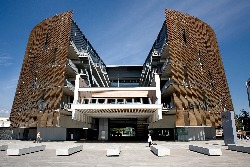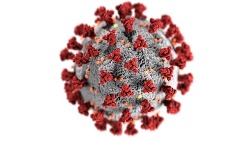
05/06/2020 - Press release
Detecting the best research talents and providing these people with financial, structural and stability means advancing in cancer care via translational research projects that improve treatment and diagnosis through innovation with clinical application. This is the ambitious goal of the innovative and cutting-edge I CRIS Research Programmes promoted by CRIS against cancer, which have already received their first awards thanks to a meticulous evaluation and selection process led by a prestigious committee of international experts. Over the next five years, the three winning projects will focus on colorectal cancer (the second-ranked cancer in terms of deaths) prostate cancer (diagnosed in 1.3 million people each year), and immunotherapy, a highly innovative type of treatment that is changing the outlook of many cancers. "Research is our life and only through research are we going to find a cure for cancer. With the CRIS Research Programmes we want to detect the best research talent and provide these people with financial and work-related peace of mind. We want to discover and support the Nobel Prize winners of tomorrow and these first CRIS Programmes are just the beginning. In the next edition we will double the number of winners, underlining our commitment to research in spite of the current situation we are experiencing",explains Diego Megía, president of CRIS against cancer.
Més informació "Dr. Clara Montagut, awarded a I CRIS Programme of Excellence in Cancer Research"
28/05/2020 - Covid-19
The impacts of the COVID-19 pandemic are far reaching and long lasting for people working in Small and Medium Enterprises (SMEs) in terms of people's wellbeing and mental health and the social and economic impacts. he EU-funded large-scale Mental Health Promotion and Intervention in Occupational Settings project began in January 2020. The project aims to improve mental health and wellbeing in the workplace by developing, implementing and evaluating a multilevel intervention targeting both prevalent psychiatric disorders (depression, anxiety disorders) and non-clinical aspects of mental health (stress, burnout, wellbeing, depressive symptoms).
27/05/2020 - General information
The Spanish Transplant Society has awarded the SET 2020 grant to intensify the research activity of Dr. María José Pérez Sáez, a consultant in the Nephrology Service and a researcher at the Hospital del Mar Medical Research Institute (IMIM). It is the only grant of this type that the organisation will award this year. The 30,000 euro grant will enable Dr. Pérez Sáez to work on one of the research projects currently underway in the department and IMIM, looking at fragility in the kidney transplant waiting list. The study of fragility in candidates for kidney transplants was launched by the Hospital del Mar's Nephrology Service in 2016, and currently has data from more than 500 patients. After an initial observational phase, in which the data collected will be analysed prospectively, two more phases have been designed: to biochemically characterise the fragile patient's phenotype, for which a biobank of samples has been set up; and a final intervention phase, with a pre-habilitation clinical trial in these patients while they are awaiting a transplant.
Més informació "Grant from the Spanish Transplant Society for a study by the Nephrology Service"
25/05/2020 - Press release

The company Chemotargets -based in the Barcelona Science Park and a global leader in the development of computational platforms for the design, optimization and safety evaluation of drugs- has signed a strategic agreement with the Hospital del Mar Medical Research Institute (IMIM) in order to accelerate research projects for the discovery and development of new oncological therapies that respond to important unmet medical needs. This public-private partnership will establish a framework for collaboration that promotes the creation of synergies between the IMIM experience in the identification of new therapeutic targets in emerging fields of cancer biology and the Chemotargets expertise in drug discovery and development. This initiative will include the use of cutting-edge computational technologies developed specifically to rapidly design drug candidates acting on new mechanisms of action or directed to targets that are difficult to address and for which no identified drugs currently exist.
20/05/2019 - Covid-19

The nationwide MIND/COVID study, headed up by researchers from the Hospital del Mar Medical Research Institute (IMIM) and Hospital del Mar, is one of the few projects funded so far by the Carlos III Health Institute (ISCIII) of the Ministry of Science and Technology. The aim is to study the mental health of healthcare workers and other key groups, as well as COVID-19 patients and a sample of the general Spanish population. Natural disasters such as severe hurricanes, floods or earthquakes, and major epidemic outbreaks -such as SARS, MERS or Ebola- lead to an increase in acute stress, symptoms of anxiety and depression, and other mental health problems. This impact can affect the most vulnerable populations in particular, and lead to the emergence of mental disorders and addictions. Healthcare workers are a vulnerable population because of the risk of contagion and the enormous workload involved in trying to manage the disease.
18/05/2020 - Covid-19
The GRIB Integrative Biomedical Informatics group (IMIM-UPF) has launched a new version of DisGeNET (version 7.0, May 8, 2020), which contains more than 1 million associations between 21,000 genes and 30,000 diseases, and 350,000 associations involving more than 190,000 genomic variants. All the data sources have been updated including the information automatically extracted by text mining of the literature. In addition, a new resource focused on COVID-19 has also been created. DisGeNET is a public knowledge management platform that offers information on genes and genomic variants associated with human diseases, which is obtained by integrating data from more than a dozen public resources and the scientific literature. DisGeNET contains one of the most comprehensive collections of genes and variants associated with human diseases that is currently available and is a resource for sharing and exchanging information recommended by the ELIXIR project, which is called, ELIXIR Recommended Interoperability Resource.
06/05/2020 - Press release
The Food and Drug Administration (FDA) Center for Drug Evaluation and Research (CDER) has licensed the Chemotargets CLARITY® platform for predicting unknown secondary targets for new molecules of pharmaceutical interest. This contract is meant to directly address the FDA's requirement for a computational method which can predict potential molecular targets from chemical structure and provide a user-friendly environment for analysis of results. Molecular targets identified with high confidence by CLARITY® may be evaluated by FDA/CDER for their association with adverse events, addiction liability, or their association with disease within the specified indication(s).
Més informació "The FDA licenses Chemotargets CLARITY platform"
04/05/2020 - Press release
A team of researchers led by Dr. Victoria Puig from the Hospital del Mar Medical Research Institute (IMIM), which also involved the Centre for Genomic Regulation (CRG), has studied the neural basis of intellectual disability in mice with Down syndrome and has discovered that the neural networks of brain circuits relevant to memory and learning are over-activated and that the connectivity of these circuits is poor. The researchers have also observed that neural activity during sleep is abnormal and probably interferes with memory consolidation. The study has even identified biomarkers in brain rhythms that can predict memory deficits in the mice which are corrected by chronic treatment with a natural component of green tea, epigallocatechin gallate, which other studies have already shown to improve executive function in adults with Down syndrome.
Més informació "New therapeutic targets for treating memory impairment in Down syndrome"
04/05/2020 - Covid-19
Today, the Barcelona-born singer Macaco is presenting his new song, Sanadoras Voluntades, a tribute to the work being done by health workers during the COVID-19 pandemic. The song and its video clip are the result of the combined efforts of the singer, the producers Nebraska and Playtime Movies, Hospital del Mar, the Friends of Hospital del Mar Foundation and the illustrator Lola Vendetta. The project was created to thank healers. "Our applause is not enough for this group of people who reject the label of heroes and simply demand protection and safety to be able to carry out their work", explains Dani Macaco, who performed and composed the song, along with Thomas Tirtha Rundquist, as well as directing the video, together with Bernat Saumell. This humanitarian initiative was supported by Hospital del Mar, one of the Catalan centres involved in treating COVID-19 patients, and by the Friends of Hospital del Mar Foundation. All the proceeds from playing the song and video clip on digital platforms, as well as the copyright, will be given to a research project at the Hospital del Mar Medical Research Institute (IMIM) in the field of COVID-19 research and treatment.
Més informació "Hospital del Mar and Macaco join forces to promote research into COVID-19"
23/04/2020 - Institutional news

The Scientific Advisory Board (SAB) is made up of a group of prestigious international scientists, experts in the different areas corresponding to the IMIM research programs. Until very recently the president of the SAB was Dr. Joaquin Arribas, but with his incorporation as director of the IMIM and scientific director of the PSMAR, will take his place Dr. Xosé R. Bustelo, Deputy Director of the Cancer Research Center (CIC), University of Salamanca-CSIC, Director of the Genomics and Proteomics Unit and coordinator of the Tumor Progression Mechanisms Program at the same center. He is also a member of the CIBERONC Steering Committee. Dr. Bustelo holds a PhD in Biology from the University of Santiago de Compostela, his scientific training includes several stays at international research centers such as the Bristol Myers Squibb Pharmaceutical Research Institute (Princeton, New Jersey, USA), as a postdoctoral fellow and later as Research Scientist and in the Department of Pathology at State University of New York (Stony Brook, New York, USA, as an Assistant Professor.
Més informació "New chairman of the IMIM External Scientific Advisory Board"
Servei de Comunicació:
Marta Calsina(ELIMINAR)
Tel:
(+34) 93 316 06 80
Doctor Aiguader, 88
08226 Barcelona
© Institut Hospital del Mar
d'Investigacions MèdiquesLegal Notice and Privacy Policy | Cookie Policy | Site Index | Accessibility | Find Us | Contact